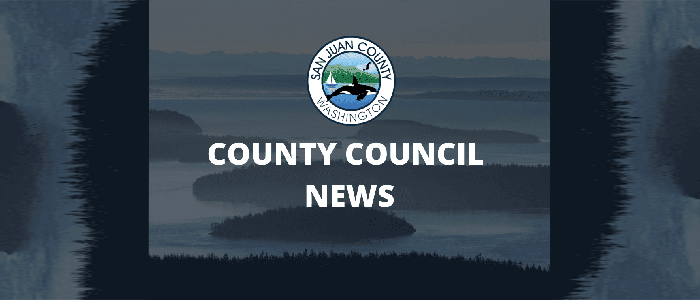||| FROM NATIONAL ASSOCIATION OF COUNTIES |||
WASHINGTON – National Association of Counties (NACo) President Gary Moore today announced the formation of a broadband task force. The task force, comprised of nearly three dozen county government officials from across America, including Rick Hughes, San Juan County Council Member, will study the lack of reliable broadband with a particular focus on the challenges facing underserved communities.
A report, titled Understanding the True State of Connectivity in America, released by NACo and partner organizations earlier this year, found that nearly two-thirds (65 percent) of U.S. counties experience the internet at speeds below minimum standards set by the Federal Communications
Commission (FCC), with that number even higher in rural America, where 77 percent of counties operate below the FCC standard.
“With the COVID-19 pandemic affecting families and businesses, the need for reliable high- speed internet is more acute than ever,” said Task Force Co-Chair Craig Rice, a Montgomery County, Md. council member. He noted that many people are attending school and working from
home. Individuals and families are relying on the internet for remote health care and conducting transactions through e-commerce.
“Our new task force will examine the intersection of public and private sector efforts to deploy broadband networks and create a blueprint for local governments to help bridge the digital divide,” said Task Force Co-Chair J.D. Clark, the county judge in Wise County, Texas.
“San Juan County is one of the most remote counties in Washington State, but is in the process of building out up to a gig of speed, via fiber to the home and business with an “LTE Wireless Mesh Overlay.” This creates access to affordable, high-speed broadband for almost every resident and allows San Juan County to be one of the most connected communities in the state. Due to partnerships with BPA, Orcas Power and Light Cooperative, Rock Island Communications, T-Mobile, San Juan County and our residents, locally owned and operated Rock Island has created a model that should be replicated around the country. I’m honored to be part of this NACO committee and hope that I may be able to share what I’ve learned with other rural communities across the country,” said Council Member Rick Hughes
Local governments often face state-imposed limitations to expanding access to broadband connectivity. In 22 states, local governments are restricted from making investments in broadband infrastructure networks. NACo is working to pass federal legislation that would remove those barriers and expand broadband access.
Lack of reliable broadband is a major barrier to socioeconomic opportunity, education, health and overall quality of life. Without access to high-speed internet, many rural communities – and even pockets in urban areas – are isolated and left behind. A 2018 study conducted by Microsoft
concluded that 19 million rural Americans do not use broadband, largely due to a lack of access. For these small communities, broadband can serve as a lifeline, connecting students to online degrees and connecting sick patients to medical consultation that is locally unavailable.
High-speed internet is also consistently identified as a top challenge facing small businesses in rural America and stifles entrepreneurship by limiting the ability of individuals to take on independent work. In this economy, broadband is critical to building resilient and future ready
communities.
See the full list of broadband task force members here. To explore all of NACo’s broadband resources, visit www.naco.org/broadband.
View Understanding the True State of Connectivity in America, here.
The National Association of Counties (NACo) strengthens America’s counties, including nearly 40,000 county elected officials and 3.6 million county employees. Founded in 1935, NACo unites county officials to advocate for county government priorities in federal policymaking; promote exemplary county policies and practices; nurture leadership skills and expand knowledge networks; optimize county and taxpayer resources and cost savings; and enrich the public’s understanding of county government. www.naco.org.
**If you are reading theOrcasonian for free, thank your fellow islanders. If you would like to support theOrcasonian CLICK HERE to set your modestly-priced, voluntary subscription. Otherwise, no worries; we’re happy to share with you.**








It is completely inappropriate of the National Association of Counties to meddle in our local election only two weeks away. It doesn’t even know if Rick Hughes will be in office on January 1. It should have waited to make the announcement, if any, until the election results are know.
David… Really? Coming from one of the foremost members of the San Juan County Democratic Party, which has chosen to spit in the face of the county charter with regard to non partisanship regarding this election, this a pretty pathetic complaint.
This is a newly formed task force, comprised of individuals from around the nation. They didn’t invent this to interfere with an election, they appointed a member that was entirely appropriate and qualified to speak to the issues.
Justin… Really? So it is your belief that the County Charter takes away the freedom of speech of political parties? And that the less voters know about candidates the better. Sounds like something Trump would do to further suppress the vote.
David,
I’m not sure what any of this has to do with Trump, but thanks for quickly pivoting back to creating a partisan divide. I think it helps others reading the conversation quite a bit. I have no issue with parties speaking and voicing there opinion.
It’s when they choose to fund, organize and provide outside consulting support for candidates that serve as officers within the party that I am bothered.
My comment is about a local charter that was specifically written to exclude party interference. As a Democrat and a San Juan County citizen , I am disappointed to see that our local party has chosen to behave in the way that it has.
As a Democrat, you are encouraged to be on our email distribution list, if you aren’t already, to attend our next virtual Zoom meeting in December, and to express your opinion on this and any other subject you choose. I can assure you that the issue of endorsements in non-partisan races was thoroughly discussed and voted on by those present before we endorsed Cindy and Ryan. And it will undoubtedly be discussed again before the next non-partisan election in our county.
Food for thought: the election of State Supreme Court judges and our Superintendent of Public Instruction are all non-partisan races. I strongly believe that political parties, D, R, etc., would be doing a disservice to their membership if they do not inform them via endorsements. That’s one of the primary purposes of political parties.
Your comments are well-taken. Would you (Justin) provide the area of the charter that you’re referring to for us to see… that seems like the crux of the issue if I’m reading you correctly. Thank you.